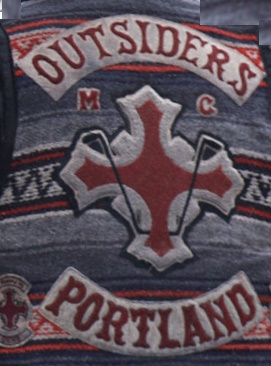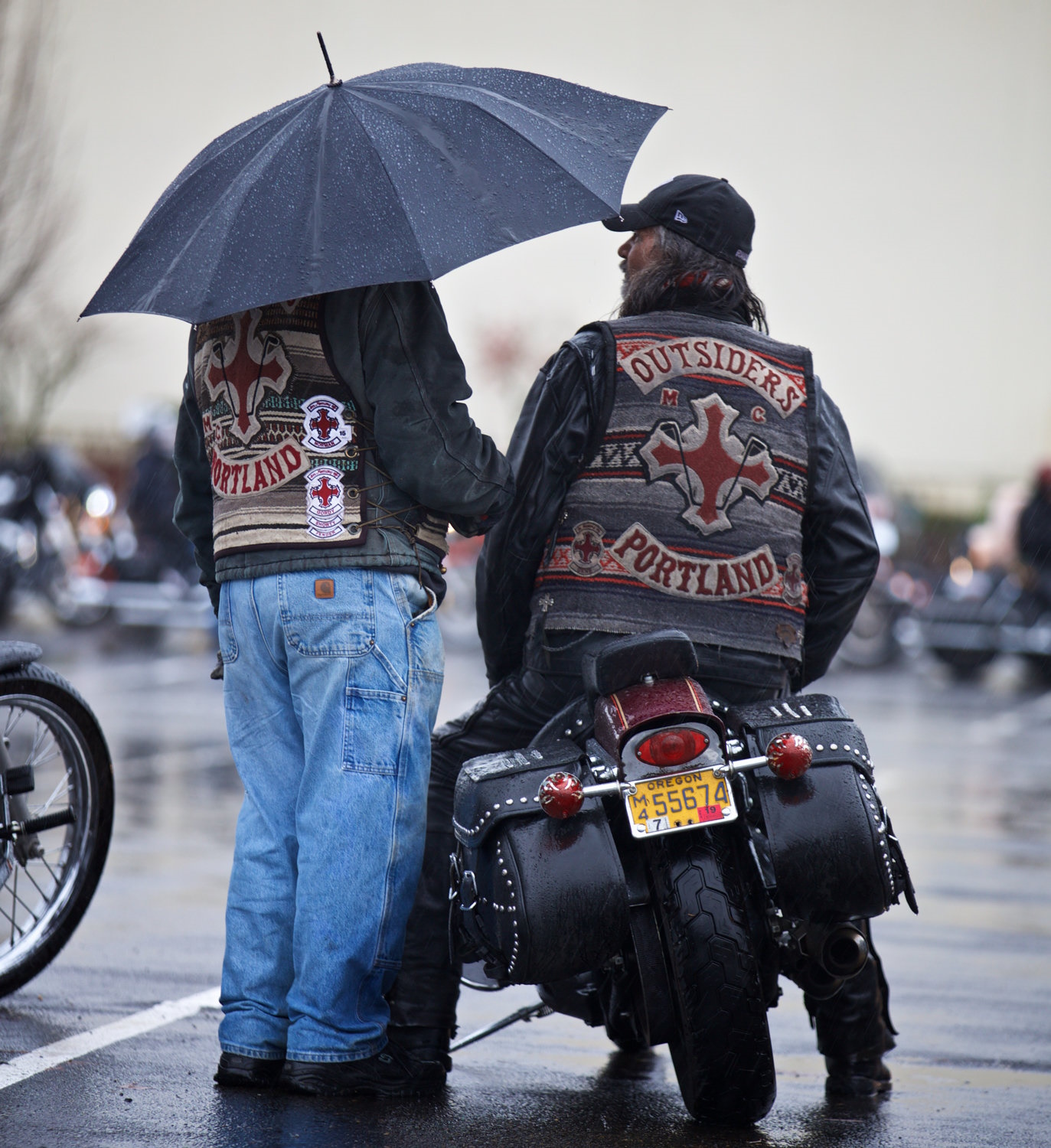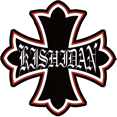Rockabilly Cross - Biker's Cross

One of the most popular cross symbols for motorcycle gangs is the Maltese Cross for its association with medieval knights.
Here's a cross favoured by fans of hot-rods, rockabilly and the general rock'n'roll scene. 'Worldly' music such as theirs is affectionately known as the Devil's music, adding to the rebellious appeal of the music. Or noise, depending on taste. The pink-edged cross is a naive attempt to mock the highest authority.
This symbol is associated around the world with motorcycle gangs such as the Hells Angels and those who, for reasons best known to themselves, wish to imitate the Hells Angels. Variations include the Maltese Cross (shown above) and the Passion Cross used by the Portland Chapter of the Outsiders Motorcycle Club (on the right)
A similar one, the Fleurie Cross (on the left) is used by the Kishidan, a Japanese bosozuko bike gang with their own tribal identity. (See also Tasuki Cross).
The Portland Outsiders' patch on their denim or leather sleeveless vest (cuttee) is a cross overlayed with what bikers call "ape-hanger" handlebars. It would be churlish to suggest that members are apes who need reminding that their Harleys and choppers are best ridden Outside, so we won't suggest that. In fact the handlebars silhouette is to show that Jesus is riding with them. Alternatively, the handlebars are draped on the cross like the shroud. Or something else. Please ask them if you really want to know.
Such bike gangs often refer to themselves to as "outlaws" due to their historical association with a rebellious and anti-establishment lifestyle. It doesn't necessarily mean they're always engaged in criminal activity, but rather signifies their rejection of conventional rules and the mainstream motorcycle culture, choosing instead to follow their own codes and often engaging in activities outside of the law or societal norms.
And you'll agree, "outlaws" sounds cool.
Indeed, they do suffer a negative image, yet such gangs have been involved in several positive activities and community service efforts over the years. Charity rides and fundraising events, blood donation drives, disaster rescue and relief efforts, even mentorship and youth programmes to help at-risk youth stay on a positive path.
And they also make sure that rock and roll music never dies.
A subgenre to emerge from rock'n'roll in the late 1960s and early 1970s is heavy metal. That music(?) is believed - by those who want to believe - to provide a channel for the Devil through the use of tritones, a musical interval that spans three whole tones, like the diminished fifth or augmented fourth. They do appear in some famous pieces of music to create tension, or just to sound a bit spooky and doomy.
The esoteric school of Pythagoras taught that these can trigger a sensual state of mind – something the Church in the Middle Ages considered was a satanic temptation. There's a legend that tritones were suppressed by the Church, labelling this musical phenomenon as the Diabolus in Musica (the Devil's Interval). However, we've found no evidence of anyone being excommunicated or otherwise punished by the Church for invoking this interval.
Whether or not the Church actually did prohibit tritones, we must remember that in the Middle Ages, neuroscience was limited to trepannation; i.e. drilling holes in a person's skull to allow evil spirits to float out. Illness was considered the work of the devil and any sexual reaction within their bodies meant a supernatural power was taking hold of them. Why sexual urges should be caused by the Devil and not God, is explored in Why the Church Doesn't Like Sex.
Trivia: Examples of tritones can be heard in many pieces, including Black Sabbath's Iron Man, Bach's Toccata and Fugue in D minor, Britain's God Save the King, the song Maria in West Side Story, and The Star-Spangled Banner.
Listen with care!
Some "open-minded' folk believe trepanning is effective in allowing more oxygen to the brain, which raises the person to a higher consciousness. Without doubt, a lack of oxygen to the brain is not good but as scuba divers know, too much (oxygen toxicity) can be fatal.
Not only is it illegal in most countries to perform surgery without a licence, trepanning can cause permanent brain damage – assuming that the person is not already insane to even consider the procedure.
There are safer and more successful ways to attain a higher consciousness.


